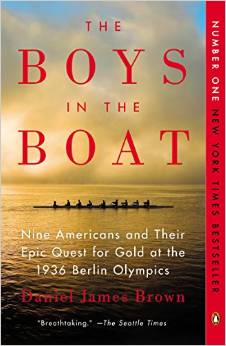
The pageantry of the 1936 Berlin Olympics was a triumph for Hitler’s propaganda machine. Evidences of the Reich’s virulent anti-semitism were swept from the streets. Gone for the duration of the games were the “Jews not welcome” signs in stores and shops. On display were the orderliness, architectural grandeur, and growing military muscle of Nazi Germany. Berlin would be the last Olympic contest until 1948, long after Hitler was dead and the city reduced to rubble.
Among the athletes competing in Berlin were Americans who became famous for not only their athletic skill, but their unconquerable courage: Jesse Owens, Glenn Cunningham, Louis Zamperini, and the men of the United States Olympic rowing team.
Daniel James Brown’s The Boys in the Boat tells the story of the University of Washington’s 8-oar crew team chiefly through the experiences of Joe Rantz, who overcame the death of his mother, expulsion from his family, grinding poverty, and Depression-era tumult to succeed as a rower, engineering student, and devoted husband and father. The other “boys” in the boat are profiled. Their stories are told against the background of preparations for the games in Berlin, and the propagandist Nazi film-making exploits of Leni Reifenstahl.
Before I read the book, I knew nothing about competitive rowing. Yet, my interest never wavered as the author described both the sport and the ingredients of a successful rowing team, not the least of which is physical strength. The author explains that “physiologists . . . have calculated that rowing a two-thousand-meter race – the Olympic standard – takes the same physiological toll as playing two basketball games back-to-back. And it exacts that toll in about six minutes.” (40)
But in addition to strength, the rowing coach must select for his team the young man with “the nearly superhuman stamina, the indomitable willpower, and the intellectual capacity necessary to master the details of technique,” and who also possessed “the ability to disregard his own ambitions to throw his ego over the gunwales, and to leave it swirling in the wake of his shell, and to pull not just for himself, not just for glory, but for the other boys in the boat.” (23)
Athletes, coaches, and all who enjoy an inspirational story will love this book.
____
Daniel James Brown, The Boys in the Boat: Nine Americans and Their Epic Quest for Gold at the 1936 Berlin Olympics. New York: Penguin Books, 2014.